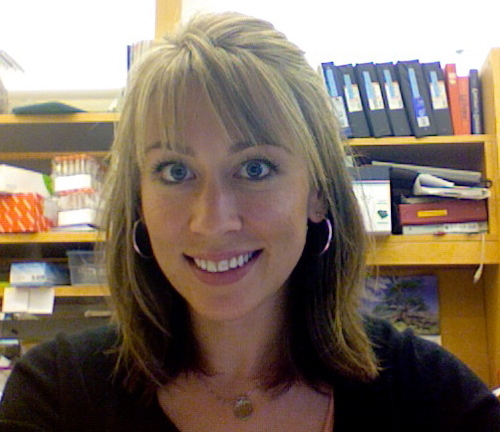In search of . . . understanding insulin networks: Ashlyn Ritter
On Tuesdays, the Daily Voice features a first-person narrative from a researcher explaining the science behind a recent grant, and the inspiration or impetus behind becoming a scientist at UMass Chan Medical School. If you know of a researcher you’d like to see profiled, send an email to UMassChanCommunications@umassmed.edu.
| Ashlyn Ritter, GSBS student studying with Marian Walhout, PhD, and Heidi Tissenbaum, PhD, associate professors of molecular medicine, talks about her fellowship grant Insulin Networks in Aging and Obesity, National Institute on Aging: one year, $29,990; recommended for four more years at $29,990 per year. |
 |
Adequate food intake is necessary for growth and development. The insulin-signaling pathway coordinates growth and development according to nutrient sensing, or food intake. Interestingly, this pathway also affects reproduction, stress response and longevity. The goal of this project is to understand how this pathway is controlled, giving insight into why and how we age.
In humans, deregulation of the insulin-signaling pathway can lead to age-associated diseases, such as type 2 diabetes, cardiovascular disease and cancer. Results from this research will allow us to further dissect how metabolism, growth/development, reproduction, stress response and aging are connected. Understanding these connections leads to better therapeutic approaches to age-associated diseases.
I love to explore and learn as much as I can! Biology is one of those fields where the questions are never-ending, so there is always an interesting idea to be explored. As an avid learner, I find the science method is the most organic way to learn. First, you observe a particular phenomena, ask a question as to why you observe such, explore the question, get it wrong, figure out why it was wrong, get it right, and then apply what you learned to the bigger picture. This process requires creativity, persistence, and repeated trial and error. In the end, it is extremely rewarding when you gain new information and can use it to help the greater good.
I wanted to be engaged with great science and diverse fields of research. This allows me to think about my research with different perspectives. UMass Chan Medical School offers that environment and encourages collaboration, providing opportunity to learn from outstanding faculty who are pioneers in their fields. Additionally, being in Worcester, I have a geographical advantage for collaboration and learning opportunities with other schools/institutions in the Boston area as well. Massachusetts is one of the best areas for scientific research in the United States, and UMass Chan Medical School is exploding with high impact research.
I like approaching a biological question by thinking about the whole organism. I think of an organism as an active system, processing information that is coming in and delegating the appropriate physiological response. What you eat, for example, will change what mechanisms your body uses to utilize energy. Life, metabolism and the ability to overcome stress are the products of many interconnected processes, which have to be appropriately regulated. It is fascinating how the body orchestrates all these molecular pathways at once and how such pathways are organized to interact with one another in order to maintain life, as we know it.